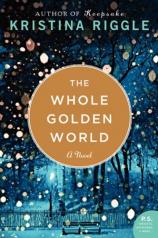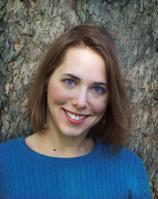Interview: November 7, 2013
Kristina Riggle, the acclaimed author of REAL LIFE & LIARS, returns with a thought-provoking novel inspired by real-life events. THE WHOLE GOLDEN WORLD is about 17-year-old Morgan Monetti, who shocks her parents and her community when she chooses to stand by the man everyone else believes has exploited her --- popular high school teacher TJ Hill. In this interview with Bookreporter.com's Terry Miller Shannon, Riggle talks about how she kept this story --- which deals with some heavy issues --- upbeat, as well as why she feels most comfortable writing her novels from multiple perspectives. She also opens up about channeling her inner teenager, why poetry should always be written longhand in a notebook, and why sometimes it’s easier to ask strangers strange questions.
Bookreporter.com: In the Author Q&A section at the end of THE WHOLE GOLDEN WORLD, you say that you found inspiration for the story in a newspaper article about a similar court case. Did that immediately inspire you to start writing the book, or was it more of a set-aside-and-ponder, or another type of process entirely that eventually caused you to sit down and begin writing?
Kristina Riggle: I knew right away it would be a great seed for a story. I didn’t sit down that very minute, but I was writing not long after. Within a few days, as memory serves.
BRC: In THE WHOLE GOLDEN WORLD, you've managed to weave thought-provoking commentary on perspective, repercussions, adulthood and shades of morality gray, while also giving us a terrific page-turner. Did you set out to accomplish this, or were you simply telling a story and the provocative themes came about organically?
KR: I don’t aim for commentary, but when I put characters into particular quandaries, their own dialogue with others, plus internal narrative, lend that sort of perspective. I don’t agree with my characters all the time, by the way. They are not mouthpieces. If they align with me, it’s coincidental, not by design.
The storytelling always comes first, though. Characters, plot, pacing, all of that matters more than any social comment.
BRC: The story unfolds via the viewpoints of the three women most affected: Morgan, Dinah and Rain. Was that your original intention, or did you begin writing with just one main character?
KR: I always write from multiple points of view, in every book (and this is my fifth). I just like writing that way, and I knew from the outset their perspectives would clash, which is why I was so interested in writing this book.
BRC: On the opposite side of the complexity scale lies TJ, who seems superficial and contemptible. I'm wondering if you ever considered giving him more worthy attributes.
KR: A few of TJ’s worthy attributes are in evidence here and there: Early in the novel, he wisely counsels a struggling student, with compassion and humor. He genuinely loves Rain, and is often demonstrably affectionate and sweet (though not consistently). He was a popular, well-liked teacher because he was good at being that kind of upbeat, positive presence that we all remember fondly from our school days.
But his actions --- understandably so --- overshadow these early glimpses of the man he might have been.
BRC: I was taken by your depiction of Morgan, which felt so true to life. How do you channel your inner teenager? Do you work with teens, have close teen friends, or read through your teen journals?
KR: Thank you. My kids are too little for me to be immersed in the teen world just yet, so mostly it was casting myself back to those days, and on particular points I would pick the brains of my mom friends who have teens.
BRC: Morgan is a closet poet, and I found her poetry to be lovely and intriguing. So I'm assuming/wondering if you write poetry, beyond what you wrote for Morgan.
KR: I’m glad! I was nervous about the Morgan poetry, because I’m not a poet. Then I rationalized that if my poetry comes out earnest and sentimental and unpolished…well, since I’m writing as a 17-year-old who never shows anyone her poems (and thus never edits them), it would work out fine.
I have noodled around with poetry in the past, mostly in high school, which is probably why it rings true from a teen perspective. Interestingly, my “Morgan poetry” is distinct to her point of view and I don’t believe would be the same if I sat down to write poetry now, as my adult self.
I wrote Morgan’s poems longhand, in a notebook, just like she does. Poetry at the keyboard feels wrong somehow.
BRC: From your descriptions of Rain's yoga practice, I'd be amazed if you didn't also practice yoga. Do you? If so, do you feel your practice impacts your writing process in any way?
KR: I have in the past, though not regularly, lately, for various reasons that aren’t very interesting. I hope those who practice yoga won’t be offended if I say that one thing from my own life I borrowed for Rain was loving the combination of grace and power, while not being able to earnestly grasp the spiritual aspect, which of course is what yoga is truly about. As Beverly says in the book, the physical form is not the point. I’m happy for anyone else who embraces yoga as a mind-body-spirit practice, but I could never get into it as a total experience.
I do break out triangle pose, downward dog and warrior poses once in a while, especially if I’m sore and stiff. I like to try and teach them to my six-year-old daughter, which is hilarious and adorable.
BRC: THE WHOLE GOLDEN WORLD deals with some heavy topics, and yet I didn't find it to be a depressing read. How did you manage to keep the storytelling upbeat?
KR: I think pacing it quickly helps. The book doesn’t dwell (and that’s a holdover from my journalism days, in part). Also switching perspectives keeps you from getting bogged down in one grim event.
BRC: I know from your author blurb that you have children. Does the fact that Dinah and Angie's mothering styles (so different!) come under the microscope have any relation to your own life?
KR: All mothers come under the microscope these days, I think! The Internet has exacerbated this. It’s one reason, though I enjoy social media, I don’t mention my kids by name on Twitter or my Facebook novel page, nor do I talk about serious kid-related issues publicly. We have issues like any family does, but that’s my private domain.
I’m not much like Angie or Dinah, either one. I also like them both, foibles and all.
BRC: How did you research this book? It encompasses so many diverse topics: legal proceedings, small business ownership, medical procedures for infertility, premature infants, parenting of children with disabilities, cello playing and so on.
KR: Some of it I could borrow from my life. I have experience with infertility (but ended up with two beautiful children), and I played violin in high school. My dad ran his own small business, and I used to write about small businesses as a reporter. But I asked cello players for suggestions on a plausible solo piece for Morgan. I had leftover research on prematurity from an unpublished novel. I borrowed a yoga teacher’s training book from my former instructor, who also pointed me toward a posture that Rain would be plausibly practicing as an advanced student. (I was trying to show off to that teacher that I remembered the lingo, and then embarrassed myself by mispronouncing “asana.” Oops.)
I was most concerned about the legal aspects. Luckily, I found through a friend-of-a-friend a retired judge who was happy to answer my weird, awkward questions and then vet my manuscript. I actually know several lawyers, but for some reason it was easier to ask my strange questions about criminal sexual conduct of a total stranger than a friend I’ve known for 20 years. Go figure.
BRC: While you were researching, did you discover anything that particularly surprised you?
KR: I had to learn how kids these days apply to college because it’s changed so dramatically in the last 20-plus years. I visited my high school guidance counselor who is still at my school, and he walked me through the process. He has years of senior pictures on his wall, including mine.
I learned quickly that lawyers don’t make “opening arguments” because you’re not allowed to argue. They’re called “opening statements.” I wondered aloud what’s the difference? Apparently it’s in the eye of the beholder.
BRC: You have written several novels, and also published many short stories. Is it challenging to keep coming up with ideas so gripping that you must write about them?
KR: I always have lots of ideas, but shaping these ideas into a compelling plot is the tough part. The short answer is yes, it’s challenging. Good thing I love my job.
BRC: What was this book's path to publication? For example, how long did the idea percolate, and how long did it take to write? Were there many revisions?
KR: My agent loved this idea, and HarperCollins bought it in the form of a few chapters and a plot sketch. There were many, many revisions, as they always are for me. It’s just the way I write. I like to get a messy first draft down quickly to keep my momentum going, but that means lots of work to polish. It took between 15 and 18 months to write.
BRC: What can we look forward to from you next?
KR: I’m forming another idea, and researching, but I never talk about works in progress!




